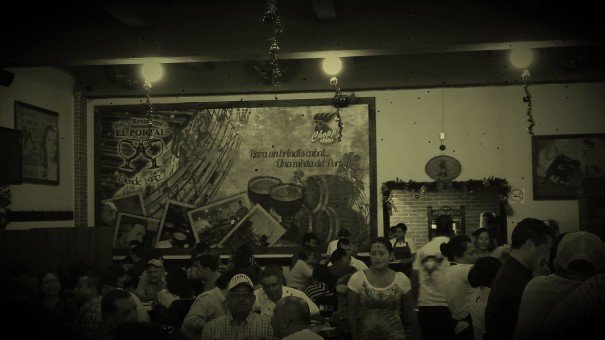
When Your Plans Are Thwarted by the Extended Stay of a Che Enthusiast

When Your Plans Are Thwarted by the Extended Stay of a Che Enthusiast
Mixta at El Portal
Oscar doesn’t seem surprised when I sit down at a bar and ordered a mixta, a mixture of light and dark beer, alone on a Monday at 4 pm. He seems to know exactly why I’m here. Tourists often visit El Portal with questions about Che Guevara, who supposedly frequented the bar in the 1950s. Oscar, who tells me he is 73, claims to remember Guevara from serving him years ago. But his full head of night black hair gives him away. As he leans against the mahogany bar, he confesses he’s actually decades younger and he never met the legendary Che. But the myth of the young revolutionary is as strong among the barstaff as tourists. Oscar even points out where Che usually sat, as described to him by his co-workers from 20 years ago who actually did serve the revolutionary.
El Portal is the second and last stop on my mini-Che tour through Guatemala City. I also visited a hotel a few blocks away where the young doctor lived during his nine months in Guatemala. My plans to stay in his old room were thwarted by the extended stay of a Che-enthusiast and the warnings of a Guatemalan friend that the price seemed too cheap for a decent hotel. But the receptionist assured me that the Pension Meza mainly caters to tourists and backpackers. He tells me I am welcome to come back and stay once the room is vacant again.
This is where I should confess that I haven’t even seen Motorcycle Diaries, but after months living in Latin America, it’s hard not to be fascinated by Che and all the contradictions his legacy brings. His name is used to sell products and experiences all over the world, from his hometown in Argentina to communist Cuba, even though he despised consumer culture. But his time in Guatemala is less well-known and not highly publicized. Che spent nine months in the Central American capital city when the Marxist government of Jacobo Arbenz was in power, but then fled to Mexico in 1954 after a U.S.-backed coup. He later wrote in his diary, “In Arbenz’s Guatemala, I realized a fundamental thing: to be a revolutionary the first thing there has to be is revolution.” As the more well-known part of the story goes, Che then met a young Fidel Castro in Mexico and became a key part of the Cuban Revolution.
Decades later, Guatemala is undergoing what some have called, “The Guatemalan Spring,” although I’m not sure it’s exactly the revolution Che was talking about in his diary. From April to September, Guatemalans filled the central plaza for months calling for the resignation of corrupt officials. They succeeded in pressuring the president and vice-president to resign, but Guatemala’s newly elected president Jimmy Morales is far from a Marxist. As I sit at Che’s old hangout, I wonder what he would think of the country’s supposed revolution. Or tourists spending $9 a night to sleep where he once lived. Or the tour group with cargo shorts and cameras dangling from their necks that just entered the bar.